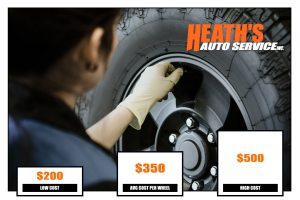For your wheels to turn efficiently, they will feature wheel bearings on the hub at each wheel. Bearings will eventually fail after years of driving. When this occurs, a full replacement is called for. Rear wheel bearings cost more to replace than front wheel bearings, averaging between $200-$500 per wheel. Let’s take a detailed look at wheel bearings and how they keep your vehicle operating smoothly and safely.
Why Are Wheel Bearings Important?
Front and rear wheel bearings ultimately allow the wheels to spin freely while supporting the entire weight of the vehicle, at the same time. These durable pieces will be found inside the wheel hub, containing tightly packed steel balls or rollers enclosed in a metal ring.
Some wheel bearings can be replaced individually, but that is not the case with most modern vehicles. No matter the type or style, wheel bearings are there to ensure safety while out on the road.
Signs Of Bad Wheel Bearings
Bad or failing wheel bearings can cause safety concerns and bring along some expensive repairs. Be mindful of the following warning signs associated with bad front and/or rear wheel bearings.
Vibrations
A bad wheel bearing can result in some noticeable steering wheel vibrations.
Humming Or Grinding Noise
Loud, rhythmic noises coming from the wheels are often indications of a damaged bearing. This will be especially noticeable while making turns.
Tire Wearing Unevenly
Faulty or damaged wheel bearings can lead to improper wheel alignment, which can result in irregular tire wear.
ABS Warning Light Appears
A bad wheel bearing could be the reason behind an illuminated anti-lock braking system (ABS) warning light.
How Much Does Rear Wheel Bearing Replacement Cost?
As mentioned, it’s more expensive to replace rear wheel bearings than front wheel bearings. This is due to the complexity of the rear suspension system. Rear wheel bearings, especially on vehicles featuring sealed hubs, can cost anywhere between $200-$500 per wheel for replacements.
The average costs of wheel bearing replacements should be around $250-$500 per wheel at most auto care shops. Luxury vehicles will come with higher costs for this replacement, usually more than $700 when combining labor costs.
Here is a quick breakdown of replacing rear wheel bearing costs:
- Lowest Cost: $200 per wheel.
- Average Cost: $350 per wheel.
- Highest Cost: $500 per wheel.
*These are cost estimates according to AutoZone. Contact the team at Heath’s Auto Service for more information.
Wheel Bearing Replacement Cost Factors
There are several factors that can impact the cost of replacing a wheel bearing. Here are the main factors that can change your overall replacement cost.
Vehicle Type
Vehicle type undoubtedly plays a big role in determining the total cost. Trucks and SUVs often have more expensive wheel bearings when compared to smaller, compact cars. Luxury vehicles can sometimes require precision parts, which will cost more.
Labor
Labor costs will typically range from $100-$300 depending on the task’s complexity and location. Rear wheel bearings are usually harder to remove and replace than front wheel bearings.
Bearing Quality
Wheel bearings do come in various grades, all the way from budget-friendly components to premium OEM parts.
Can You Replace Wheel Bearings Yourself?
With the proper experience and necessary tools, you will be able to replace the wheel bearings yourself. Bearings typically cost between $50-$250 each.
Use the following tools for this DIY project:
- Torque wrench.
- Jack and jack stands.
- Socket set.
- Slide hammer or bearing puller.
- Bearing grease.
- Screwdrivers.
- Pliers.
- Gloves and goggles.
Of course, doing this as a DIY task can save time and money. However, it could result in some costly mistakes. If you don’t want to risk the quality of this replacement, Contact the team at Heath’s Auto Service today!
Heath’s Auto Service In Scottsdale, AZ
At Heath’s Auto Service, we offer a comprehensive range of services and repairs to meet all your automotive needs. From routine maintenance like oil changes and tire rotations to more complex repairs involving brake systems, engine diagnostics, and transmission issues, our highly skilled technicians are equipped with the latest tools and technology to ensure your vehicle is serviced to the highest standards. Contact our team today!

